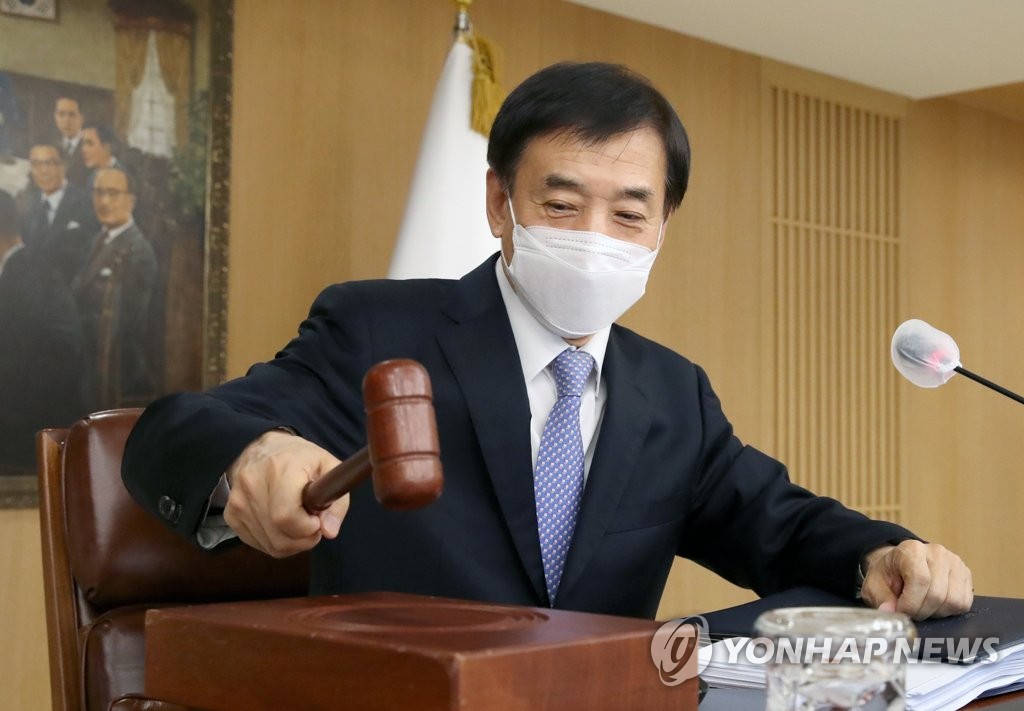ID :
623008
Thu, 02/24/2022 - 03:15
Auther :
Shortlink :
http://m.oananews.org//node/623008
The shortlink copeid
BOK freezes policy rate amid pandemic, Ukraine crisis

SEOUL, Feb. 24 (Yonhap) -- South Korea's central bank held its key interest rate steady Thursday as it remains worried that the upsurge in COVID-19 infections and heightening geopolitical risks stemming from eastern Europe could undercut the momentum for economic recovery.
As widely expected, the monetary policy committee of the Bank of Korea (BOK) voted to freeze the benchmark seven-day repo rate at 1.25 percent.
The decision came after the central bank delivered a quarter percentage-point hike in January at its first rate-setting meeting of the year. January's rate increase marked the third of its kind since August last year, bringing borrowing costs back to pre-pandemic levels.
Separately, the BOK revised its outlook for inflation this year sharply upward to 3.1 percent from 2 percent predicted in November amid surging energy costs. It was the first time that the inflation outlook has been raised above 3 percent since April 2012. Its growth projection for 2022 remains unchanged at 3 percent.
The recent rate increases had been mostly aimed at keeping a lid on growing inflationary pressure and reining in household debt after the rate had been maintained at ultralow levels for about two years to prop up the pandemic-hit economy.
The BOK decided to leave the rate steady this time as it wants to have time to gauge the impact of those three rate hikes amounting to a combined 0.75 percentage point.
Thursday's decision is also attributable to anxiety over the recently spiking coronavirus infections and heightening tensions in Ukraine that could weigh on the country's economy.
South Korea's health authorities reported Thursday that daily COVID-19 cases surpassed 170,000 for the second straight day, almost doubling from a week earlier. Infections have been surging in recent weeks due to the fast spread of the more transmissible omicron variant.
Tensions surrounding Ukraine have also been mounting as Russia ordered the deployment of troops into breakaway regions of eastern Ukraine. The U.S. defined the move as an invasion of the country and announced sanctions on Russia. Fears are growing that a military clash in the region could raise energy and raw material prices for South Korea.
Another reason for the BOK to leave the key rate unchanged this month might be intended to wait until it becomes clear how fast and drastically the U.S. would increase its policy rate to counter inflation. The Federal Reserve is widely expected to begin to raise the policy rate in March.
South Korea's economy, Asia's fourth-largest, has been on a recovery track thanks to robust exports and rebound in spending after a slump caused by the pandemic.
The country's gross domestic product is estimated to have grown 4 percent in 2021, a marked turnaround from a year earlier when the economy shrank 0.9 percent, the worst performance since 1998, earlier central bank data showed.
Inflation still remains as a potential drag on the economy. The fast economic recovery and a rebound in spending along with high energy prices and global supply snarls have added to inflationary pressure.
The country's consumer prices rose 3.6 percent on-year in January, staying over the 3 percent mark for fourth straight months. January's figure was higher than the central bank's midterm target of 2 percent for the 10th straight month.
The BOK has hinted at more rate hikes going forward.
Following the rate hike decision in January, BOK Gov. Lee Ju-yeol told reporters that the country's monetary policy remains "accommodative" and that he did not see an additional 0.25 percentage rise as tightening of monetary policy.
Meanwhile, Thursday's rate-setting meeting was the last one presided over by Lee before he leaves office at the end of March. The BOK's next rate-setting meeting is to be held on April 14.
kokobj@yna.co.kr
(END)





